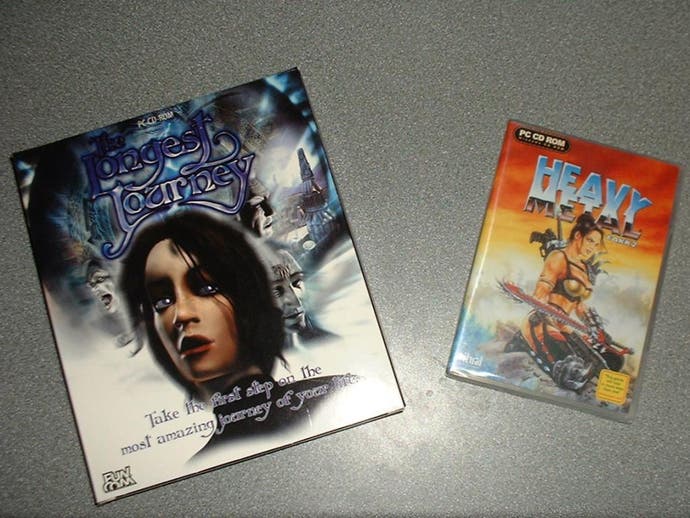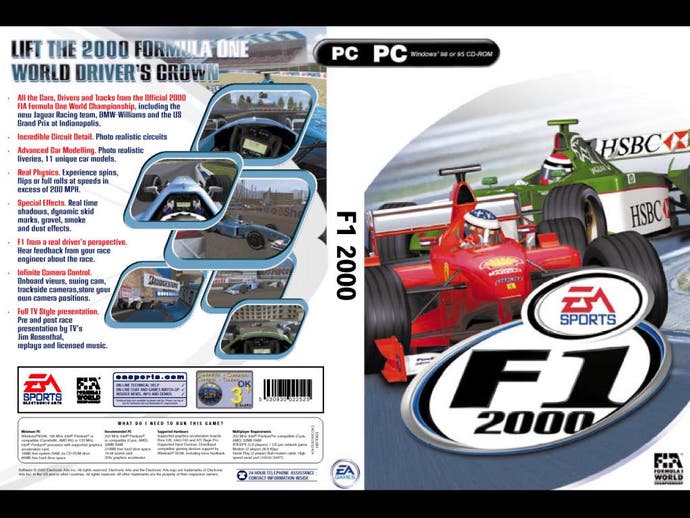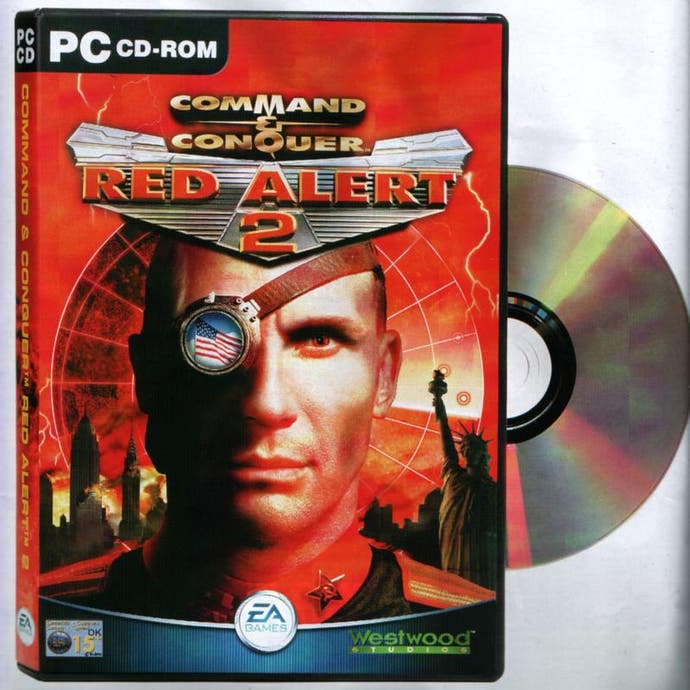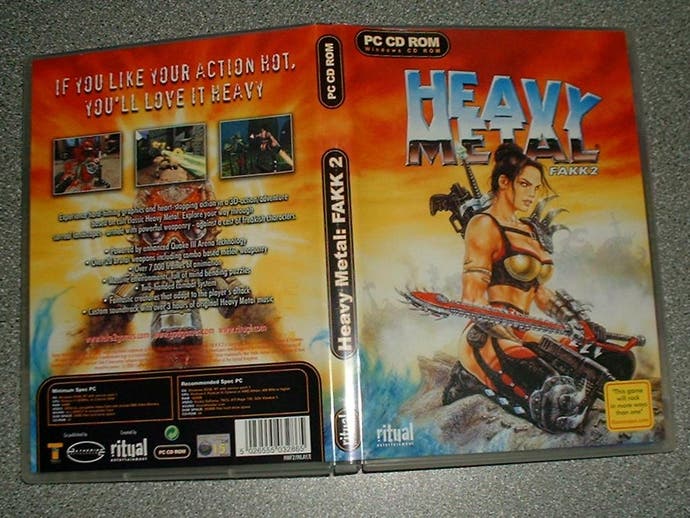Boxing Clever?
Article - something is changing in your local high street computer games store...
One of the big new releases last Friday in the UK was "Heavy Metal : FAKK2", a Quake 3 engined third person action-adventure game from Ritual and the Gathering of Developers. But although it's a good enough game in its own right, there was something else about it which made it stand out from the crowd. We're talking of course about the way it was packaged...

Changes
FAKK2 was the first game to be released by Take 2 Europe in their new DVD style packaging - a small plastic case rather than the big cardboard "Sierra boxes" which have become the norm over the last decade. And they aren't the only publisher to move away from cardboard; over the next few months every major publisher in the UK is likely to follow suit. Another big name publisher leading the charge is Electronic Arts. From the beginning of October all of their PC games (including promising titles like "Red Alert 2", "Black & White" and "Alice") will be packaged in DVD cases. Frank Sagnier, EA Europe's Vice-President for Marketing, believes that this is a big step forward for the gaming industry. "EA has a long tradition of teaching the interactive entertainment sector to think outside the box. Now quite literally we are bringing every aspect of our industry into the digital age. For years consumers have been sold high-tech products in low-tech cardboard boxes, and thrown these boxes away as soon as they get their games home. To carry on using boxes makes neither economic nor ecological sense. For retailers as much as consumers, the cardboard box is a literal waste of space." Simon Jobling, Vice President of International Marketing at Take 2, joined him in singing the praises of DVD boxes, saying that they "have a far more modern / high technology perception with consumers than the old PC cardboard and, as the DVD format is smaller, it also means unit costs of distribution are reduced, and more product and titles can fit on-shelf in retail". Given the ever increasing range of PC games on offer, this is obviously a good thing for retailers, for whom shelf space limitations can sometimes be a major issue. Simon also pointed out that "from a logistics perspective [DVD boxes] are far less prone to damage". I'm sure we all have computer games in our collections whose cardboard boxes have got squashed after spending months in the back of a cupboard. Virgin Interactive (who distribute most of Interplay's games in the UK as well as their own titles) are another company who will be moving to DVD cases over the next couple of months. Virgin's Jon Brooke picks out the "cheaper cost" of the packaging as the most obvious advantage of switching to using DVD boxes, but adds that "more importantly they're easier to store, more durable, easier to transport, and you can fit more on to shelves".

Recycle
Some of the other reasons given for switching to DVD cases are rather more bizarre though. Take 2 claim that they are "more easily re-cyclable" than cardboard boxes, which doesn't really make a whole lot of sense when you think about it... Frank Sagnier puts a slightly more convincing case for plastic DVD cases being more environmentally friendly than the traditional cardboard packaging, pointing out that "EA alone produces over 10 million cardboard boxes each year, which consumers are quick to discard, and EA is intent on cutting down on this wastage". Certainly the current cardboard packaging is bulky and wasteful - they might look impressive on shelves, but when you get one home and open it up most of it is full of empty space, or more bits of cardboard designed to stop the meagre contents from rattling around inside during transportation. The larger size of cardboard boxes can be an advantage though, and Take 2's Simon Jobling admitted that "some consumers equate bigger packs with better value for money", although he added that "personally I believe video games consumers are a bit wiser than that". The other disadvantage of using DVD cases from the publishers' point of view is that it could cause confusion with DVD movies, although Simon believes that "retail should be able to deal with this". Certainly FAKK2 came with the words "PC CD ROM" on the front cover in large letters, and EA are planning a similar scheme for their own PC releases, so any confusion should be minimal.

Boxed In
Of course, not everybody agrees, and understandably the British Box and Packaging Association (BBPA), which represents the manufacturers of the cardboard boxes currently used by the gaming industry, aren't too happy with the change. "At present, the consumer buys computer software in a substantially sized box that is also capable of holding multiple disks, detailed manuals, additional product information, and give-aways", they argue. "The new plastic box will struggle to hold even a small manual and one disk, so unless the manuals are now going to be printed on thinner (and cheaper feeling) paper, there are already capacity issues to be concerned about." More complex games like flight sims, which often come with bulky manuals that can stretch to a hundred pages or more, are going to have a hard time fitting themselves into a DVD case, as are epic single player role-playing games, which can often span several CDs. Double-size DVD cases can hold as many as four disks, but with a manual as well it's going to start getting cramped in there for some games. A move to distributing games on DVD-Rom should solve this problem for a while, although from past experience the file size of games will continue to grow to fit whatever medium is currently available. Another potential problem with the current stampede is one of supply. "There are very few suppliers of the premier grade DVD style box, and their capacity is obviously limited. Currently the DVD market itself is expanding, causing a squeeze on supply, and if the computer games market suddenly decides to standardise on this box, where will the extra capacity come from?" The BBPA says that the real reason for the change in packaging "is primarily cost", and if prices rise due to a shortfall in supply this advantage could soon be wiped out. And of course the plastic in the cases used comes from oil, the price of which (as has been dramatically demonstrated recently) is very erratic. Again, changes in the price of raw materials could reduce the cost advantage of DVD boxes, which the BBPA claims is "typically less than 20p" per unit.

Presentation
The BBPA also argues that size does matter. "The product presentation is much more limited with the proposed plastic format, the space available is drastically reduced, and the print options are significantly inferior due to the 'paper insert in a plastic sleeve' style of packaging". "The options available with the cardboard box are much more impressive including embossing, foil, and UV spot varnish. Will the market view the plastic packed product as inferior because the whole package's presentation is inferior? And what impact will this have on the price the consumer expects to pay for the software?" Simon Jobling disagrees though, pointing out that the paper insert means that "from a European perspective the [DVD case] format allows far more scope in having country-specific packaging, rather than multi-lingual packaging". This in turn means that you will actually have more space on the box in some European countries, as you can print seperate inserts for each country instead of having to replicate the same text in several different languages.
Conclusion
Regardless of the BBPA's arguments though, it looks fairly certain now that the European gaming industry will standardize on DVD cases over the next year. But America seems set to stick to the traditional cardboard packaging, for now at least. In fact, American computer game boxes were already somewhat larger than the ones used in the UK. Why is that? "Whereas perhaps the emphasis in the US was on providing lots of information and graphics for consumers, in Europe this was balanced by the pressure on maximising profit per square foot", according to Simon Joblings. "Also, shrink-wrapping was considered a necessity by most European retailers, but not in the USA, so the front cover flap was never a possibility over here." Jon Brooke of Virgin has a far simpler explanation though. "Unfortunately Americans still believe that bigger is better (check out their cars!), whilst I like to think Europeans are a little smarter and less egocentric." So there you have it!

